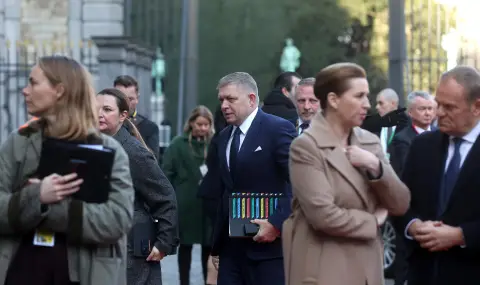Anti-government protests are expected to take place in more than 50 cities in Slovakia today.
Discontent in the country escalated after Prime Minister Robert Fico visited Moscow in December and was filmed shaking hands with Russian President Vladimir Putin. Many Slovaks fear that Fico's pro-Russian positions will lead the country away from the European Union and NATO. The ugly attacks on Ukrainian President Volodymyr Zelensky are also alarming.
All this has led to a crisis within Slovakia's ruling majority itself, with Fico apparently panicking and fears that the government will fall growing.
These are not the first protests against Fico
In 2018, Fico resigned as prime minister after mass protests against his rule. The nationalist and pro-Russian rhetoric became the fuel for his party “Smer“ to return to power in 2023. “Smer“ "has lost a lot of moderate support, so Fico is using extremist and pro-Russian rhetoric to attract radical voters, of which there are many in Slovakia," says political scientist Radoslav Stefančík of the University of Economics in Bratislava.
The Slovak prime minister accuses his opponents of organizing a coup led from abroad. He has also announced plans for anti-European and anti-LGBT constitutional changes, which has only increased anxiety among pro-Western parties and voters. On January 24, 100,000 people took to the streets of Slovakia under the slogan "Slovakia is Europe." More mass protests are expected today. The press office of the Bratislava government did not respond to DW's request for comment.
Is Fico's ruling coalition falling apart?
Whether Fico will succeed in imposing himself on his coalition partners - the Social Democratic Party “Vlaš“ and the right-wing Slovak National Party - is still unclear. For months, there have been disputes over positions among the ruling party, and contradictions over foreign policy threaten the majority, which is holding on by a hair. The opposition is demanding a vote of no confidence, and Fico has already rejected holding one once.
“Fico's coalition, which is harming Slovakia, is gradually falling apart,“ says the leader of the main opposition party “Progressive Slovakia” Michal Simečka to DW. “We are convinced that political change is within reach.“
For now, however, the predictions are that the coalition will hold. Although there are disputes among its members, and the country is in crisis regarding the budget and the healthcare system, they would not sacrifice their posts for the time being.
Aggression, paranoia, conspiracy theories
However, Fico's behavior seriously threatens stability in the country. Critics strongly condemn his aggression, paranoia and the fanning of conspiracy theories. Over a hundred psychiatrists and psychologists signed an open letter last month, sharing their concerns about the prime minister's mental health after the assassination attempt in May. Fico claims that since they failed to eliminate him physically, the opposition aimed at his political assassination.
“I think we will have early elections sooner or later“, says Andrej Matisak of the Slovak newspaper “Pravda“. “The majority of the ruling party is very shaken and I can't imagine how they will govern for another two and a half years.“
Even with early elections, however, few are optimistic. According to political scientist Radoslav Stefančík, the turn to Moscow can also be seen as an attempt to secure support for the next campaign, which is suspected to have been received by pro-Russian candidates in the recent elections in Romania and Moldova.
Simečka's party is leading in the polls for the moment, but Slovaks remember well how the previous liberal opposition government collapsed after a series of failures. And that is what opened the doors for Fico to power.
Slovakia's future is uncertain
If early elections are called, the decisive vote for the next government is expected to once again fall to the Social Democrats from “Vlaš“. Their founder - Peter Pellegrini - was elected president of the country last year. For many, however, the party has no clear identity. Some factions of it are genuinely progressive, others are simply “Smer“, but in different guises.
“The opposition may try to convince “Vlaš“ to go to the other side of the barricade in order to gain a better image both at home and abroad, but this is unlikely“, says political scientist Vera Zuborova. “The party had the opportunity to do exactly that after the last elections, but chose to side with Fico.“
All of this leaves Slovakia in a state of political instability and facing a future that looks far from bright.
Author: Tim Gosling
